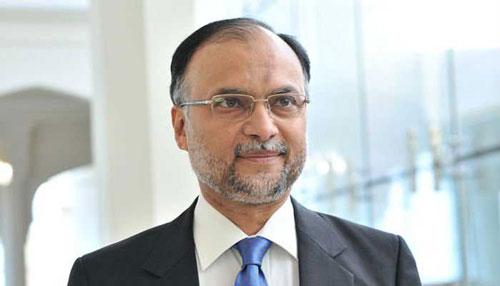Minister for Planning, Development and Special Initiatives Ahsan Iqbal has said that the country needed an ‘Economic Long March’ to move on a consistent path of development and prosperity.
Participating in a private television programme, he urged opposition parties to play a positive role in Parliament so that the country could move forward to achieve the goal of economic stability effectively.
He criticized a political party for making failed attempts to dent the country’s talks with the International Monetary Fund (IMF), terming it ‘Economic Terrorism.’
Ahsan Iqbal was of the view that the financial matters of the country could not be sustained on loans permanently and stressed the need to increase production capacity, suggesting imposing an export emergency in the country.
Last year, the Ministry of Planning set up a 5-Es framework consisting of Export, Energy, Equity, E-Pakistan and Environment, under which a comprehensive plan had been prepared for the implementation of the framework and suggestions from all the ministries in this regard to be sought.
Replying to a question, the federal minister said all chambers of commerce would have to play their due role so that more efficiency could be achieved in agriculture, information technology and other sectors with value addition of the products.
Citing the examples of developing countries like Korea and Japan, Ahsan Iqbal said these countries had progressed by increasing their production capacity.
He vowed to lead the country towards development during the next five years under the dynamic leadership of Pakistan Muslim League-Nawaz (PML-N).
To another question, the minister said he could not even think of rolling back the 18th Constitutional Amendment due to the sensitivity of its nature; however, some matters including the Benazir Income Support Programme (BISP) could be discussed with the provinces.
He said the total revenue of the federal government was Rs7000 billion after taking out the share of the provinces. Debt repayment written in the budget was Rs7300 billion, which actually stood at Rs8000 billion, while Pakistan would have to borrow Rs1000 billion rupees to pay its debts.
Further narrating the country’s fiscal position, he said federal government expenses were Rs700 billion, pension payments Rs800 billion and defence expenditure Rs1800 billion.
He said the country’s development budget was Rs950 billion and about Rs1200 billion were the transfer payments to provinces. “Some subsidies are also paid by the government which is about Rs1200 billion. All these payments are on loans. No country can be run in such a way that every expenditure is on debt.”—APP










